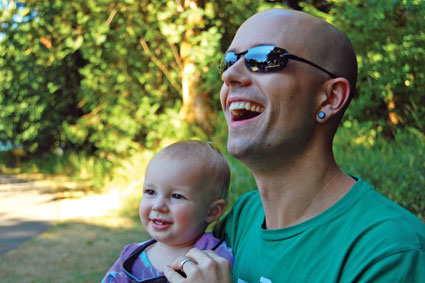 As a developmental psychologist, I think about milestones daily. My research looks at one major cognitive milestone in human development: the ability to understand other people’s behaviors as motivated by their mental states.
As a developmental psychologist, I think about milestones daily. My research looks at one major cognitive milestone in human development: the ability to understand other people’s behaviors as motivated by their mental states.
Another ongoing project in my laboratory is investigating the acquisition of verbs. Given the fact that while humans are not the only animal that can learn nouns, but are the only animal that can learn and use verbs, acquiring verbs is certainly a meaningful milestone.
Before my daughter, Soren, was born on Commencement Day 2009, I would have predicted that among all her developmental milestones, I would be most excited to witness one of these, where my personal and professional lives cross.
I would have been wrong.
A short time ago when Soren was just under 15 months old, we were in Seattle visiting my brother and his girlfriend. We were sprawled in living room chairs while Soren walked from the coffee table to the TV collecting all the remote controls she could find. She had three in her arms and was trying, albeit unsuccessfully, to add a fourth.
At this point my brother told a joke, probably one he wouldn’t have said in front of our mother, and we all laughed. Then it happened. Soren, startled from the fascinating world of remote controls, looked around the room at all of us chuckling. She donned the goofiest of grins, threw her head back (just like her daddy!), and erupted with the most artificial, most adorable laugh I have ever heard.
Her belly laugh sent us into hysterics, which in turn made her laugh again, and that cycle continued for several minutes. There was something charming and innocent in that laugh, but that is not why, a month later, I still think about it nearly every day. Although she had already been engaging in behaviors that I would call “social”—like waving hello and good-bye and blowing kisses to anyone close enough to catch them—I felt as though there was something about that laugh that ushered her into the social realm of humans in a qualitatively new way.
Over the past month, I have been asking myself what, exactly, was different about that laugh. As a developmental psychologist, I often caution my students that we must resist the urge to answer questions like this by assuming that if an infant’s behavior looks like an adult’s, then it must have been motivated by a thought process similar to that of an adult. Infants cannot talk to us, so we do not really know what they are thinking. We guess. We hope that our guesses are informed by good research and careful consideration, but at the end of the day we are making educated guesses. All this is to say that I should know better than to over-interpret that laugh.
But to hell with that! I am a proud daddy, and I reserve the right to be irrationally sentimental when it comes to my baby girl.
So here is what I like to think that laugh meant: Soren realized in that moment that laughter is a shared experience, that laughter draws us into a group, and, most important, that she wanted to be part of the group and laughter granted her admission. I think in that moment she gained a new and dawning understanding of what it means to be in a human community. And she reveled in it.
If that isn’t a milestone worth sharing, I don’t know what is. It sure beats verb acquisition.
Eric Olofson is Byron K. Trippet Assistant Professor of Psychology at Wabash.
 As a developmental psychologist, I think about milestones daily. My research looks at one major cognitive milestone in human development: the ability to understand other people’s behaviors as motivated by their mental states.
As a developmental psychologist, I think about milestones daily. My research looks at one major cognitive milestone in human development: the ability to understand other people’s behaviors as motivated by their mental states.